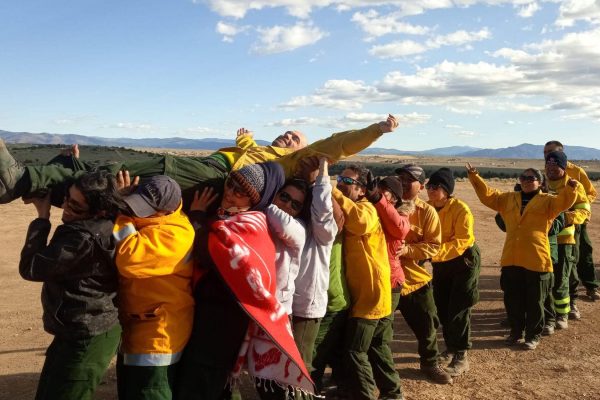HOW WE WORK
The work of the Fire Networks centers the people who are creating change on the ground. We know that when we help local people to navigate their own pathways toward a better relationship with fire, they do. We invest in local fire practitioners and community leaders, connecting them with others, and with programs, training, tools and resources that they can use to help their communities and landscapes live better with fire. We also amplify these local solutions and approaches, sharing them with decision-makers and other place-based leaders.

Complementary Strategies
We work through four interconnected strategies to build trust-based relationships. We deliver project funding, training and workforce development, and connections to hundreds of organizations and leaders in places across the U.S. We support community action, experiential training, the spread of ideas and innovations, and mentoring and leadership development, and create feedback loops between the people on the ground and decision-makers at state and national scales.

-
Strategy:
Support partnerships and collaborative approaches to advance wildfire resilience in place. -
Strategy:
Build leadership capacity and expand roles and opportunities for practitioners using fire and supporting fire adapted communities. -
Strategy:
Inform policy and the funding environment to support integrated fire management and fire adapted communities. -
Strategy:
Facilitate learning networks and infrastructure that enables effective action at multiple scales.
We facilitate collaborative partnerships and planning to create a shared understanding of fire, a vision and plan of action, and facilitate implementation. No one can address fire issues alone—the risk and solutions are shared—so we rely on partnerships and collaborative planning processes as the foundation for effective action.
Capacity is not something that can just be handed to someone. We work with local leaders over time, making sustained investments, offering experiential fire training, peer learning and connections, providing mentoring and coaching, creating access to information and ideas; and designing learning spaces where people are valued and power is built.
With connections to thousands of practitioners, The Fire Networks can help inform agency leaders, policy makers and funders who are in positions to shift towards proactive fire management approaches and community preparedness.
Our relationship with wildfire is a classic “wicked problem.” In order to work on the root issues, we need to take action together, use emergent strategy, and facilitate ongoing adaptive learning. The Fire Networks create the infrastructure that supports adaptive capacity and action and provide a community for leaders in the movement for better fire to find and offer inspiration, fellowship, and support.

